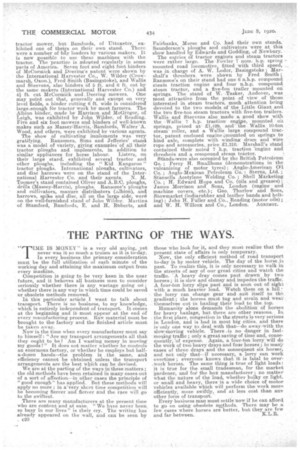THE PARTING OF THE WAYS.
Page 18

If you've noticed an error in this article please click here to report it so we can fix it.
" IME IS MONEY" is a. very old aaying, yet never was it so much a: truism as it is to-day. In every business the primary consideration must be the full utilizatiOn of each minute of the working day and attaining the maximum output from every maehine.
C'o'mpetition is going to be very keen in the near future, and it behoves all business men to consider seriously whether there is any wastage going oil; whether there is any way in which time could be saved or obsolete methods removed. .
In this pstrtienlar arti,ele. I Want to talk about transport. There is no business, to nay knowledge, which is entirely independent of transport. It comes at the beginning and it must appear at the end of every rnaaufacturing process. Raw material must be brought to the factory and the finished article must be taken away.
Now is the time when every manufacturer must say to himself : "Are my transport arrangements all that they ought to be ? Am I wasting money in moving my goods?" It does not matter whether lie controls an enormous factory, or whether he employs but halfa-dozen hands—the problem is . the same, and efficiency cannot be obtained unless the transport arrangements are the best whfch can be devised.
We are at the parting of the ways in these matters; the old methods have been retained in many oases out of a sort of affection—in other eases the principle of "good enough" has applied. But these methods will apply no more ; in a'very short time competition will be becoming fiercer and fiercer and the race will go to the swiftest.
There are many manafacturers at the present time who are content and at ease. "We have never been so busy in our lives" is their cry. The writing has .already appeared on the wall, and can be seen by c20 those who look for it, and they must realize that the present state of affairs is only temporary.
Now, the only efficient method of road transport to-day is by motor vehicle. The day of the horse is past. To realize this, it is only necessary to walk in the streets of any of our great cities and watch the traffic. "A heavy dray comes past drawn by two horses; it is slow and clumsy and impedes-We traffic. A four-ton lorry slips past and is soon out of sight with a, much heavier load. Watch them on a hillthe lorry can changegear and suit itself to the gradient; the horses must tug and strain and wear themselves out in hauling their load to the top. Humanity alone demands the abolition of horses for heavy haulage, but, there are other reasons. In, the first place, congestion in tha streetsis very serious in London, and is bad in most big cities, and there isemly one way to deal with that—do away-with the slow-moving vehicle. There -is no danger in fastmoving traffic ; only a great saving of time and, consequently, of expense. Again, a four-ton lorry will do the work of two heavy drays and row horses; in marace cases of three drays and the consequent six horses, and not only that—if necessary, a lorry can work overtime ; everyone knows that it is fatal to over.work horses. horses. The same thing is true of light loads: it is true for the small tradesman, for the market gardener, and for the bot manufacturer ; no matter what the nature of the load, whether bulky or light. or small and heavy, there is a wide choice of motor vehicles available which will perform the work more efficiently, more swiftly, and at less cost than any other form of transport.
Every business man must settle now if he can afford to go on using obsolete methods. There may be a few cases where horses are better, but they are few and far between. K. L. R.




























